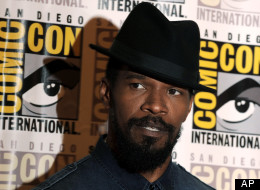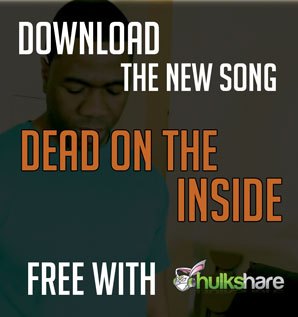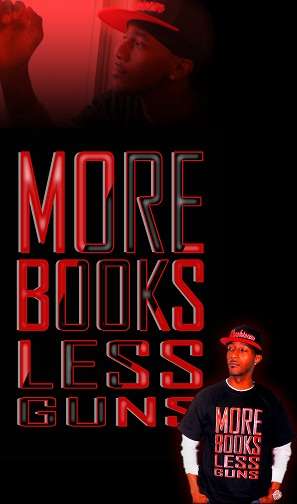-From huffingtonpost.com
The Huffington Post | By Mike Ryan Posted: 07/15/2012 10:25 am Updated: 07/15/2012 5:24 pm
Shorty after the sizzle reel of "Django Unchained"
premiered at Comic-Con on Saturday, I met with two stars of the film,
Jamie Foxx and Kerry Washington -- who also appeared together in "Ray"
-- on a very hot hotel balcony just a stone's throw (OK, more like a
stone's catapult) from where that footage premiered.
"Django Unchained," the story of a freed slave seeking a violent
revenge on the man who kidnapped his wife, was famously written by
Quentin Tarantino as a starring vehicle for Will Smith.
Smith, due to scheduling conflicts, couldn't star in the film, so the
title role went to Jamie Foxx. Here, Foxx and Kerry Washington (who
plays his wife) talk about what the rambunctious production --
apparently alcohol shots were often involved -- and Foxx explains why he
didn't hesitate to take the role of Django, even though it was written
with someone else in mind.
I know it's hot. I did not pick this location.
Washington: It's hot!
I requested air conditioning.
Foxx: Do you want to put some sunscreen on?
No thank you. I probably need sun, I feel like I've been in a dark room for three days straight. Have you two been to Comic-Con before?
Foxx: I haven't.
Washington: I've been here before, for "Fantastic Four." They're going to have Django costumes next year!
I have to admit, that footage was great.
Foxx: Quentin Tarantino is a hip-hop artist. Do you know what I mean?
No.
Foxx: What do hip-hop artists do? When they know they've got a hot record, they leak it and they let you fester on it. Because he knows what he has. So, today is a hip-hop move. And, from what I hear, it did what it was supposed to do. And that's not even ... we know what it is. I mean, we're not trying jinx it.
With an intense movie like this, does it help that you two have worked together before?
Foxx: In this movie there are times when we had to go places ... Kerry, to me, is the most courageous in the film because she's the woman. When you see things being done to men, that's one thing. When it's done to a woman, when Kerry has to take lashes and she asks to be hit with a whip -- those types of things, if we didn't have a connection, it would be tough to get through. We have a connection, so we can talk about where we want to go or what she has to go through. We had to go places, you know? To be in a situation in which she's compromised by these men ... so, without that connection, it would have been tough.
You were actually hit by a whip? One that could leave a mark?
Washington: Well, no, there were stunts. And there was a different kind of whip.
Foxx: But for her to take the lashes, for me, looking in, we're actually in Shack Row, where actual slaves were there.
Washington: Yeah, we shot in an actual slave plantation. So, that was the other thing. You're there, hearing this sound of a whip and flesh. And hundreds of years ago, that's the sound that echoed through that alley. And this is not a once in a lifetime experience -- this isn't Joan of Arc -- this was a daily practice used to subjugate and keep them down. You know, one of the things that is so incredible about the experience of making the film is that this is a part of history that we don't want to deal with. We don't want to talk about it. So, we've never dealt with the brutality of this part of American history in this way. And it's one thing to not even want to talk about it, but to actually have to see it -- to go there -- has been hard.
That's an interesting point. After watching that footage, I said, "That was awesome." But then I think about the subject matter and I question if I should be saying that.
Foxx: No, you should be saying that.
But it's disturbing.
Washington: Why we had to go there is because this is a film about a hero. This is about a man who at a time when people are only considered three-fifths of a human being, so believes in his own humanity -- and the humanity of his woman -- that he goes across the country and into the depths of hell to rescue her. To honor their love for each other. That heroism, him facing all of that, doesn't mean anything if we don't represent the brutality of what he's coming out of. So we had to go to all of these dark places. So him saving her really means something so we understand what the stakes were.
At the panel, Jamie made a statement that, "We all have egos." This script was famously written for Will Smith. At any point did your ego not like that you weren't the first choice?
Foxx: No, man. Are you kidding me? [Laughs]
Well, you are the one with the Oscar.
Foxx: To be honest with you, I really think that things happen for a reason. I think if Will would have done it, it would have been fantastic. You know, it didn't work out. He was doing other things. Will also called me and said, "This is the part to be in." He really loved the script. Look, you get the chance to work with Quentin Tarantino, Kerry Washington, Leonardo DiCaprio, Samuel L. Jackson, Christoph Waltz -- you have to be a part of that. That's the other thing, too. Sometime your ego can get you out of sh-t. It can have your ass sitting there and thinking you're all this, meanwhile the world is going past you. It's really about art. Cinema. Whether they paid us or not, we want to be there. You want to be there with these people.
Washington: And things work out. Here you have this tale about this husband and wife being reunited. And here you have two actors being reunited as husband in wife. It's like everything happens for a reason.
What's the one biggest difference working on a set with Quentin Tarantino? As in, "OK, that's different."
Foxx: [Laughing] You go first.
Washington: [Laughing] Um ... the thing I think that surprised me the most, because his movies are so dark and violent, full of brutality. It surprised me how much joy he is committed to having every day on set.
Foxx: He'll crack a joke, man, and it will permeate through the whole place. He's playing music, he's dancing. Every 100th roll we'd do a shot.
Wait, really?
Foxx: Yeah, man. We'd have the chains on, "Pour that tequila!"
Washington: [Laughing] And at the same time, even he was changed by this subject matter. He was always playing music, but, on those days we were in Oak Alley with the whipping, the only music was gospel, morning to night. But the difference working with him is that it's about loving your job.
You mentioned the Tarantino style of violence. Were you ever shooting a scene and thought, Nope, I've never seen that before?
Washington: I don't want to spoil who gets shot, but there was one character who got shot. And I have not done a lot of movies like this ... and I could not stop laughing. Which was very inappropriate. [To Foxx] Did you know he was going to have do that?
Foxx: He flew fifty feet in the air.
Washington: And after the visual of what happens when he gets shot is mind blowing.
Foxx: You didn't see it when the girl got shot. It was some Wicked Witch of the West.
Washington: Oh! I heard! I heard!
Foxx: She got shot, she just disappeared. It was hilarious. Put it this way: Watching it in front of that audience, I said, "Man, if they're rolling right now, they have no idea."
Washington: They have no idea.
Quentin Tarantino has a habit of making some fairly obscure references. Were there any times that you were looking at him thinking, I have no idea what you're talking about?
Washington: All the time. All the time!
Foxx: I was like, "Give me 1000 DVDs of all of these movies. I'm going to watch all of these movies so I'm going to be up on my sh-t."
Washington: He's not just like that with movies. He's like that with movies and TV shows and theater.
Have either of you been in a movie with this much hype? I mean, "Ray" is a great movie, but no one lined up for footage of it months before it came out. Can the anticipation be a bad thing, expectations-wise?
Washington: It doesn't matter. You never know if people are going to respond to anything. So, you can't get attached to that part of it. The weird thing for me has been talking about it when we're not done shooting it. That's been the hard part. We're still in it and it's still evolving. We're talking about scenes that we haven't even shot yet.
How much more shooting is left?
Washington: Another week of shooting.
In the footage, Jamie is wearing a very elaborate blue outfit. Where did that come from?
Foxx: That's my sh-t. That's my sh-t. Nah, but you'll see. Look, when we're talking about this scene, at first it was a different way -- Christoph picked the outfit. I said, "No. If he's a slave and never had clothes, let him pick his clothes. And he's going to pick the colors." That "new money" sh-t. Any black person, any time we get some sh-t ... like, I used to say this; I used to say this at the black Oscars, "Why are we at the black Oscars with Triscuits and Ritz crackers on the table? When you all know you should have some fried chicken and some potatoes and some red soda." I said, "I'd do everything black." If I get a 500 Mercedes Benz, I can't drive it until I get the rims. Or get the tint on there -- the right tint, too. There's a gradual tint that you go through...
Washington: [Laughing] The gradual but illegal tint.
Foxx: Exactly. Then I say, "I've got to get the doom." And people are like, doom? I say, "You all don't know what doom is? You black people don't know what doom is?" "What is doom, Jamie?" [Singing] "Doom, doom, da doom, doom." So I told them, "I'm going to pick that blue outfit because that's my doom." And it works.
Mike Ryan is senior entertainment writer for The Huffington Post. You can contact him directly on Twitter.
EARLIER: "Django Unchained" footage reactions from Cannes
I know it's hot. I did not pick this location.
Washington: It's hot!
I requested air conditioning.
Foxx: Do you want to put some sunscreen on?
No thank you. I probably need sun, I feel like I've been in a dark room for three days straight. Have you two been to Comic-Con before?
Foxx: I haven't.
Washington: I've been here before, for "Fantastic Four." They're going to have Django costumes next year!
I have to admit, that footage was great.
Foxx: Quentin Tarantino is a hip-hop artist. Do you know what I mean?
No.
Foxx: What do hip-hop artists do? When they know they've got a hot record, they leak it and they let you fester on it. Because he knows what he has. So, today is a hip-hop move. And, from what I hear, it did what it was supposed to do. And that's not even ... we know what it is. I mean, we're not trying jinx it.
With an intense movie like this, does it help that you two have worked together before?
Foxx: In this movie there are times when we had to go places ... Kerry, to me, is the most courageous in the film because she's the woman. When you see things being done to men, that's one thing. When it's done to a woman, when Kerry has to take lashes and she asks to be hit with a whip -- those types of things, if we didn't have a connection, it would be tough to get through. We have a connection, so we can talk about where we want to go or what she has to go through. We had to go places, you know? To be in a situation in which she's compromised by these men ... so, without that connection, it would have been tough.
You were actually hit by a whip? One that could leave a mark?
Washington: Well, no, there were stunts. And there was a different kind of whip.
Foxx: But for her to take the lashes, for me, looking in, we're actually in Shack Row, where actual slaves were there.
Washington: Yeah, we shot in an actual slave plantation. So, that was the other thing. You're there, hearing this sound of a whip and flesh. And hundreds of years ago, that's the sound that echoed through that alley. And this is not a once in a lifetime experience -- this isn't Joan of Arc -- this was a daily practice used to subjugate and keep them down. You know, one of the things that is so incredible about the experience of making the film is that this is a part of history that we don't want to deal with. We don't want to talk about it. So, we've never dealt with the brutality of this part of American history in this way. And it's one thing to not even want to talk about it, but to actually have to see it -- to go there -- has been hard.
That's an interesting point. After watching that footage, I said, "That was awesome." But then I think about the subject matter and I question if I should be saying that.
Foxx: No, you should be saying that.
But it's disturbing.
Washington: Why we had to go there is because this is a film about a hero. This is about a man who at a time when people are only considered three-fifths of a human being, so believes in his own humanity -- and the humanity of his woman -- that he goes across the country and into the depths of hell to rescue her. To honor their love for each other. That heroism, him facing all of that, doesn't mean anything if we don't represent the brutality of what he's coming out of. So we had to go to all of these dark places. So him saving her really means something so we understand what the stakes were.
At the panel, Jamie made a statement that, "We all have egos." This script was famously written for Will Smith. At any point did your ego not like that you weren't the first choice?
Foxx: No, man. Are you kidding me? [Laughs]
Well, you are the one with the Oscar.
Foxx: To be honest with you, I really think that things happen for a reason. I think if Will would have done it, it would have been fantastic. You know, it didn't work out. He was doing other things. Will also called me and said, "This is the part to be in." He really loved the script. Look, you get the chance to work with Quentin Tarantino, Kerry Washington, Leonardo DiCaprio, Samuel L. Jackson, Christoph Waltz -- you have to be a part of that. That's the other thing, too. Sometime your ego can get you out of sh-t. It can have your ass sitting there and thinking you're all this, meanwhile the world is going past you. It's really about art. Cinema. Whether they paid us or not, we want to be there. You want to be there with these people.
Washington: And things work out. Here you have this tale about this husband and wife being reunited. And here you have two actors being reunited as husband in wife. It's like everything happens for a reason.
What's the one biggest difference working on a set with Quentin Tarantino? As in, "OK, that's different."
Foxx: [Laughing] You go first.
Washington: [Laughing] Um ... the thing I think that surprised me the most, because his movies are so dark and violent, full of brutality. It surprised me how much joy he is committed to having every day on set.
Foxx: He'll crack a joke, man, and it will permeate through the whole place. He's playing music, he's dancing. Every 100th roll we'd do a shot.
Wait, really?
Foxx: Yeah, man. We'd have the chains on, "Pour that tequila!"
Washington: [Laughing] And at the same time, even he was changed by this subject matter. He was always playing music, but, on those days we were in Oak Alley with the whipping, the only music was gospel, morning to night. But the difference working with him is that it's about loving your job.
You mentioned the Tarantino style of violence. Were you ever shooting a scene and thought, Nope, I've never seen that before?
Washington: I don't want to spoil who gets shot, but there was one character who got shot. And I have not done a lot of movies like this ... and I could not stop laughing. Which was very inappropriate. [To Foxx] Did you know he was going to have do that?
Foxx: He flew fifty feet in the air.
Washington: And after the visual of what happens when he gets shot is mind blowing.
Foxx: You didn't see it when the girl got shot. It was some Wicked Witch of the West.
Washington: Oh! I heard! I heard!
Foxx: She got shot, she just disappeared. It was hilarious. Put it this way: Watching it in front of that audience, I said, "Man, if they're rolling right now, they have no idea."
Washington: They have no idea.
Quentin Tarantino has a habit of making some fairly obscure references. Were there any times that you were looking at him thinking, I have no idea what you're talking about?
Washington: All the time. All the time!
Foxx: I was like, "Give me 1000 DVDs of all of these movies. I'm going to watch all of these movies so I'm going to be up on my sh-t."
Washington: He's not just like that with movies. He's like that with movies and TV shows and theater.
Have either of you been in a movie with this much hype? I mean, "Ray" is a great movie, but no one lined up for footage of it months before it came out. Can the anticipation be a bad thing, expectations-wise?
Washington: It doesn't matter. You never know if people are going to respond to anything. So, you can't get attached to that part of it. The weird thing for me has been talking about it when we're not done shooting it. That's been the hard part. We're still in it and it's still evolving. We're talking about scenes that we haven't even shot yet.
How much more shooting is left?
Washington: Another week of shooting.
In the footage, Jamie is wearing a very elaborate blue outfit. Where did that come from?
Foxx: That's my sh-t. That's my sh-t. Nah, but you'll see. Look, when we're talking about this scene, at first it was a different way -- Christoph picked the outfit. I said, "No. If he's a slave and never had clothes, let him pick his clothes. And he's going to pick the colors." That "new money" sh-t. Any black person, any time we get some sh-t ... like, I used to say this; I used to say this at the black Oscars, "Why are we at the black Oscars with Triscuits and Ritz crackers on the table? When you all know you should have some fried chicken and some potatoes and some red soda." I said, "I'd do everything black." If I get a 500 Mercedes Benz, I can't drive it until I get the rims. Or get the tint on there -- the right tint, too. There's a gradual tint that you go through...
Washington: [Laughing] The gradual but illegal tint.
Foxx: Exactly. Then I say, "I've got to get the doom." And people are like, doom? I say, "You all don't know what doom is? You black people don't know what doom is?" "What is doom, Jamie?" [Singing] "Doom, doom, da doom, doom." So I told them, "I'm going to pick that blue outfit because that's my doom." And it works.
Mike Ryan is senior entertainment writer for The Huffington Post. You can contact him directly on Twitter.
EARLIER: "Django Unchained" footage reactions from Cannes









 WRECKTEAM DOPE
WRECKTEAM DOPE









